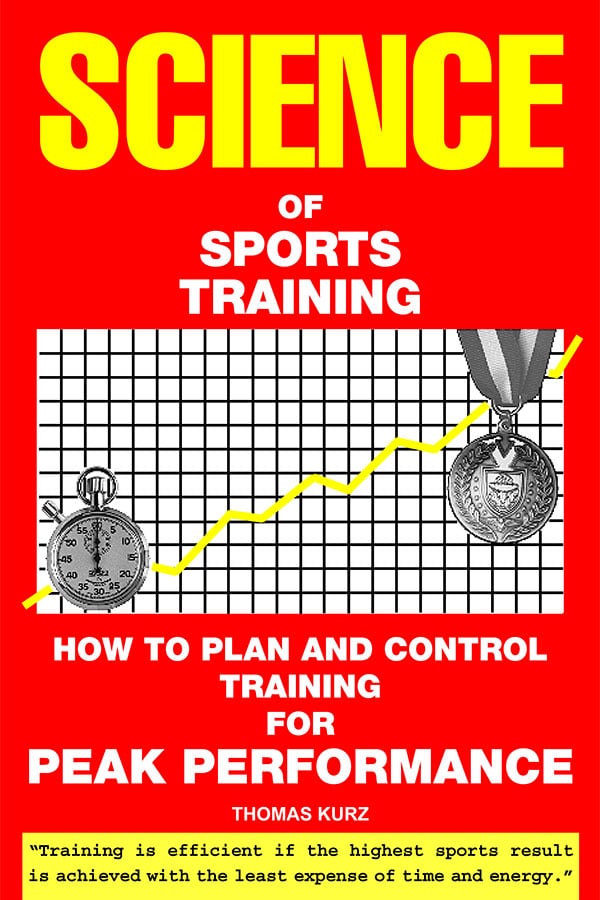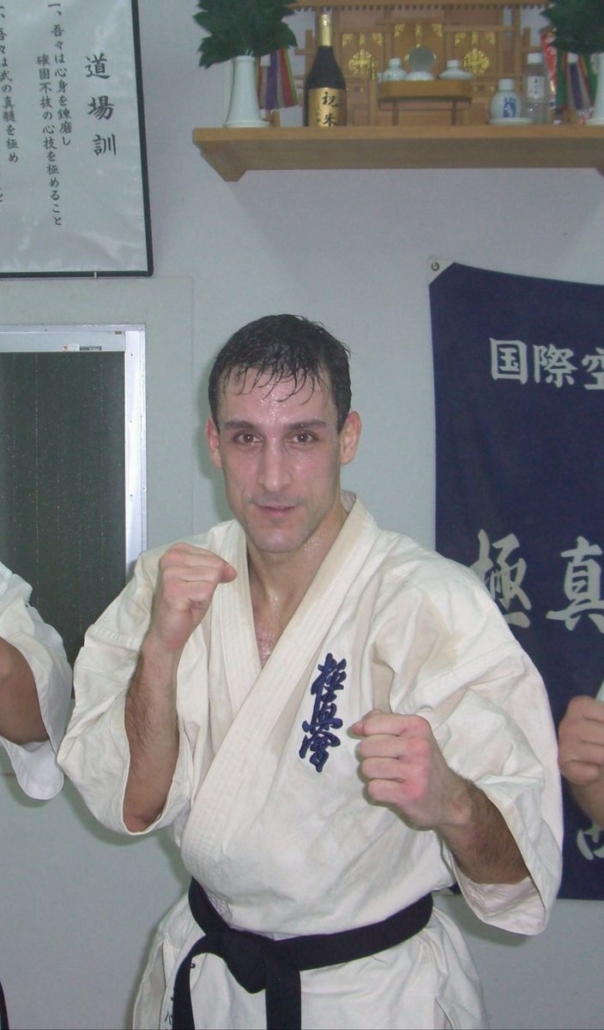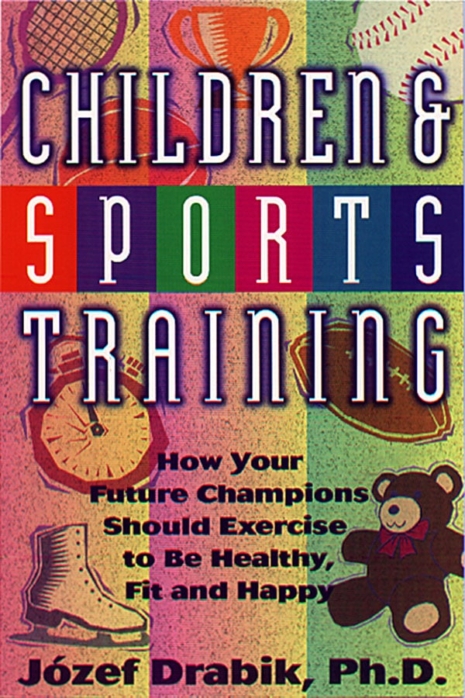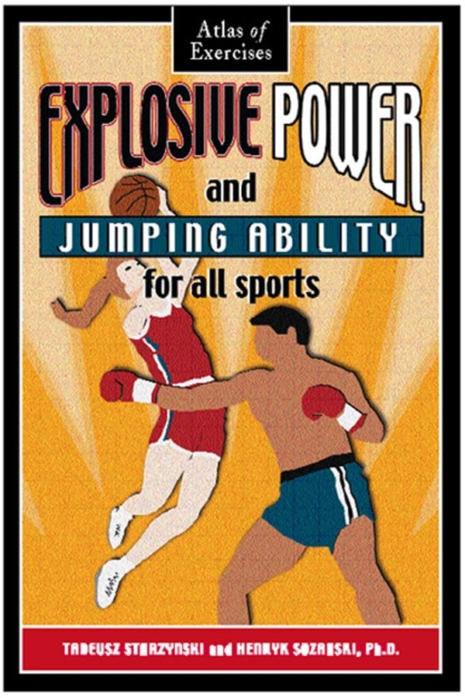To order the downloadable PDF version of Science of Sports Training click “ADD TO CART” below.
Science of Sports Training PDF
- Science of Sports Training by Thomas Kurz
Downloadable PDF, read only, no printing or copying allowed.
“Training is efficient if the highest sports result is achieved with the least expense of time and energy.” Use the sports training know-how of internationally known training specialists to improve your speed, strength, power, endurance, coordination, and flexibility, as well as technical and tactical skills, while avoiding overtraining and injuries.
Science of Sports Training: How to Plan and Control Training for Peak Performance
by Thomas Kurz
“Training is efficient if the highest sports result is achieved with the least expense of time and energy.”
Use the sports training know-how of Eastern European and other internationally known training specialists to improve your speed, strength, power, endurance, coordination, and flexibility, as well as technical and tactical skills, while avoiding overtraining and injuries.
- Apply time- and energy-saving methods in your training.
- Master your techniques faster, react quicker, last longer, and prevent injuries.
- Improve your speed, strength, endurance, and coordination.
- Integrate physical training with mental training.
- Learn how and when to apply means of recovery.
- Learn how to integrate nutrition with training for best results.
- Learn how to plan and control sports training from workout to workout, week to week, month to month, and year to year so as to get the best results with minimum time and energy expenditure.
The principles and methods explained in this book are illustrated by examples from several sport disciplines (track and field, swimming, boxing, wrestling, gymnastics, and ball games), and are easily applied in every sport. Further, these examples are presented in such a way as to make it easy to apply the conclusions to any other sport.
Table of Contents
PART I
INTRODUCTION TO SPORTS TRAINING
1. Basic Concepts in Sports Training
- Definitions
- Classification of Sport Disciplines
- Methods of Training
- Types of Exercises
- Factors Affecting the Ability to Train and Compete
2. Principles of Sports Training
- The Principle of Conscious Involvement
- The Principle of Enriching Sensory Images
- The Principle of Individualization and Accessibility
- The Principle of Gradual Increase of Loads
- The Principle of Specialization
- The Principle of Providing a General and Versatile Foundation for Future Specialization
- The Principle of Specialization of General Preparation
- The Principle of Continuity and Systematicness in the Training Process
- The Principle of the Cyclic Character of the Training Process
- The Principle of Economy of Effort
3. Cycles in Sports Training
- Cycles in Life
- Cycles and Periodization of Training
- Structure of a Workout
- Warm-Up
- Main Part
- Cool-Down
- Structure of a Microcycle
- Types of Microcycles
- Structure of a Mesocycle
- Types of Mesocycles
- Structure of a Macrocycle
- An Alternative Explanation of Periodization
- Periods of a Macrocycle
- Macrocycles in a Yearly Training Plan
- Olympic Cycle
4. Nutrition
- Protein
- Carbohydrate
- Carbohydrate Loading
- How to Spare Glycogen
- How to Replenish Glycogen
- Carbohydrate, Sweet Foods, and Health
- Fat
- Proper Ratios of Macronutrients
- Vitamins and Minerals
- Nutritional Supplements
- Water
- Not All That’s Wet Is Water . . .
- Soft Drinks
- Chemicals in the Water
- Making Weight
- Eating Before a Workout and a Competition
- Eating After a Workout and a Competition
- Evaluating a Nutrition System
5. Natural Means of Recovery
- Sleep
- Natural Environment
- Music
- Massage
- Water
- Means of Recovery in a Macrocycle
PART II
DEVELOPING PHYSICAL ABILITIES
6. Strength
- Concepts and Types of Strength
- Strength Training
- Strength Exercises
- Properties of Strength Exercises
- Methods of Strength Training
- Strength Training vs. Technical Training
- Strength Exercises in Developing Speed
- Developing Explosive Strength and Jumping Ability
- Strength-Endurance
- Preparation for Strength Training
- Strength Training for Young Athletes
- Injury Prevention and Strength Training
- General Strength Training
- Directed Strength Training
- Sport-Specific Strength Training
- Strength Exercises in a Workout
- Strength Exercises in a Microcycle
- Strength Exercises in a Macrocycle
7. Speed
- Speed Training
- Properties of Speed Exercises
- Methods of Developing Speed
- The Speed Barrier and Methods of Overcoming It
- Strength Exercises in Speed Training
- Developing Speed of Reaction
- General Speed Training
- Directed Speed Training
- Sport-Specific Speed Training
- Speed Exercises in a Workout
- Speed Exercises in a Microcycle
- Speed Exercises in a Macrocycle
8. Endurance
- Factors Affecting Endurance
- Endurance Training
- Methods of Endurance Training
- Special Methods of Increasing Endurance
- General Endurance Training
- Directed Endurance Training
- Sport-Specific Endurance Training
- Particular Features of Developing Endurance in Team Games and Contact Sports
- Endurance Exercises in a Workout
- Endurance Exercises in a Microcycle
- Endurance Exercises in a Macrocycle
9. Coordination
- Coordination Training
- General Coordination Training
- Directed Coordination Training
- Sport-Specific Coordination Training
- Coordination Exercises in a Workout
- Coordination Exercises in a Microcycle
- Coordination Exercises in a Macrocycle
10. Agility
- Agility Training
- General Agility Training
- Directed Agility Training
- Sport-Specific Agility Training
- Agility Exercises in a Workout
- Agility Exercises in a Microcycle
- Agility Exercises in a Macrocycle
11. Flexibility
- Kinds of Flexibility
- Flexibility Training
- Flexibility in Sports
- Types of Stretching Exercises
- Injury Prevention and Flexibility
- General Flexibility Training
- Directed Flexibility Training
- Sport-Specific Flexibility Training
- Flexibility Exercises in a Workout
- Flexibility Exercises in a Microcycle
- Flexibility Exercises in a Macrocycle
PART III
DEVELOPING PHYSICAL SKILLS AND MENTAL TOUGHNESS
12. Technique
- Technical Training
- Immediate Feedback in Technical Training
- General Technical Training
- Directed Technical Training
- Sport-Specific Technical Training
- Technical Exercises in a Workout
- Technical Exercises in a Microcycle
- Technical Exercises in a Macrocycle
13. Tactics
- Tactical Training
- General Tactical Training
- Directed Tactical Training
- Sport-Specific Tactical Training
- Tactical Exercises in a Workout
- Tactical Exercises in a Microcycle
- Tactical Exercises in a Macrocycle
14. Developing Mental Toughness
- General Psychological Training
- Qualities of Strong Will and Physical Exercises
- Competitions as a Means of Developing Strong Will
- Sport-Specific Psychological Training
- Motivation
- Prestart States
- Control of Prestart States and Performance with Mental Training
- Psychological Training in a Workout
- Psychological Training in a Microcycle
- Psychological Training in a Macrocycle
PART IV
PLANNING AND CONTROL OF TRAINING
15. Goals of Training and the Model of a Champion
16. Long-Term Planning
- Annual Training Plans
17. Control of the Training Process
- Principles of Control of Sports Training
- Flaws of Control
- Training Effects and Their Control
- Overtraining
- Stages of Overtraining
- Treatment for Basedowic Overtraining
- Treatment for Addisonic Overtraining
- The Uglier Sibling of Overtraining
- Control of Planned Loads in a Workout
- Control of Planned Loads in a Microcycle
- Control of Planned Loads in a Mesocycle
- Control of Planned Loads in a Macrocycle
18. Measurements and Tests
- Basic Physiological Measurements
- Testing Physical Abilities
- General Tests of Physical Abilities
- Energy Fitness
- Neuromuscular Fitness
- Sport-Specific Tests of Physical Abilities
- Testing Technical and Tactical Skills
- Psychological Tests
BIBLIOGRAPHY
INDEX
Our Guarantee
If you are not happy with your purchase of the book, return it within 90 days with your original invoice, and we will refund the price of merchandise (less shipping and handling)!
Testimonials
“The second edition of the book is outstanding. The changes add a lot to the book. I feel it is a definitive book in the field because it is a good blend of the theoretical and practical. It is something that the coach can easily use. I recommend it over all the others. Your book reflects the reality of training an athlete.”
Vern Gambetta
Conditioning consultant for the US Men’s 1998 World Cup Soccer team, conditioning coach for the Tampa Bay Mutiny Major League Soccer team (1996–1997), Director of Conditioning for the Chicago White Sox organization (1987–1996), and coach of the women’s track and cross-country program at the University of California, Berkeley (1977–1982)
“Knowledge with experience. Works like this inspire trust.”
Stanislaw Przybylski, M.D.
University School of Physical Education, Gdansk, Poland
“Presents a uniquely Eastern European look at this practical subject matter . . . [with] considerable emphasis on strength training and periodization. Substantial application to the interests of a serious student of the strength sports.”
Powerlifting USA
“Kurz presents a manual of East European training principles to elite athletes of the West. His . . . chapters give an excellent overview of training for the development of speed, strength, flexibility, psychological preparation, recovery, and the testing and monitoring of skills. His text is logically organized and well indexed. This unique title is recommended for collections in physical education, coaching, and athletic training.”
Library Journal
“Thank you for Science of Sports Training. I am sure you will realize great interest in this subject from our National Governing Bodies.”
Dr. Charles J. Dillman
Deputy Executive Director, U.S. Olympic Committee
Colorado Springs, Colorado
“Explains the Eastern European principles and methods of sports training that lead to individual peak performances without resorting to harmful or illegal methods such as doping. A key principle to achieving peak performances is the development and control of the athlete’s own rational individualized training regimen. Kurz describes the optimum sequence of types of exercises in a workout, in a weekly cycle of workouts, or for longer periods, carefully explaining the physiological basis for the sequence.”
Recreation Resources
“[Science of Sports Training] will give the [reader] new ideas on how to manage the training loads of athletes in different sports.”
Fitness Management
“Offers new training information from both Eastern and Western sports specialists. Includes the safest and fastest methods of developing strength, speed, reaction, endurance and flexibility, and expert knowledge of technical, tactical, and psychological training. Describes the sequence and types of exercises in a productive workout, in a weekly (or longer) cycle of workouts. Readers will learn the best time of day to train for technical, speed, strength, endurance, or flexibility exercises.”
Tae Kwon Do Times
See what others say about Science of Sports Training.









This is the best book possible on Sports training and programming.